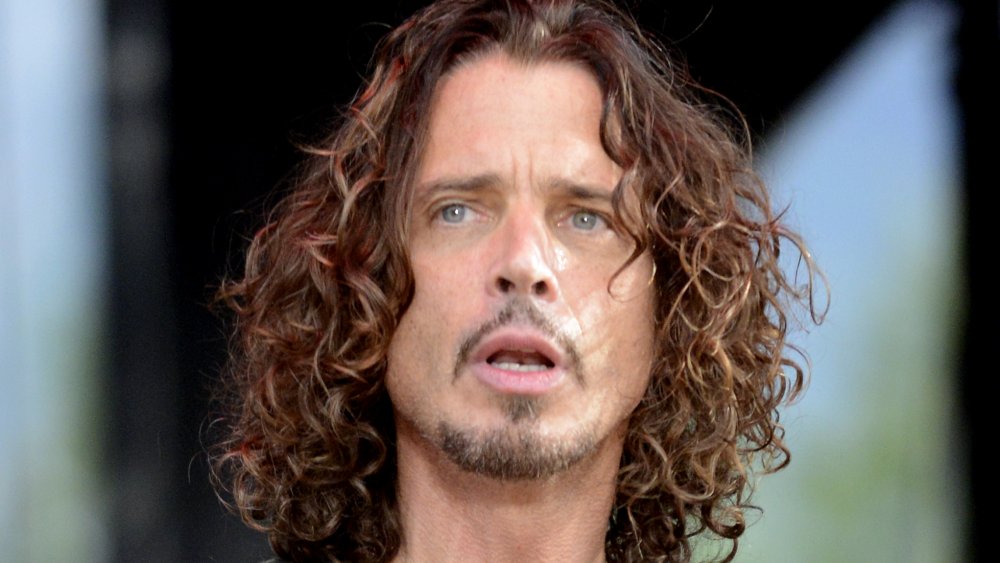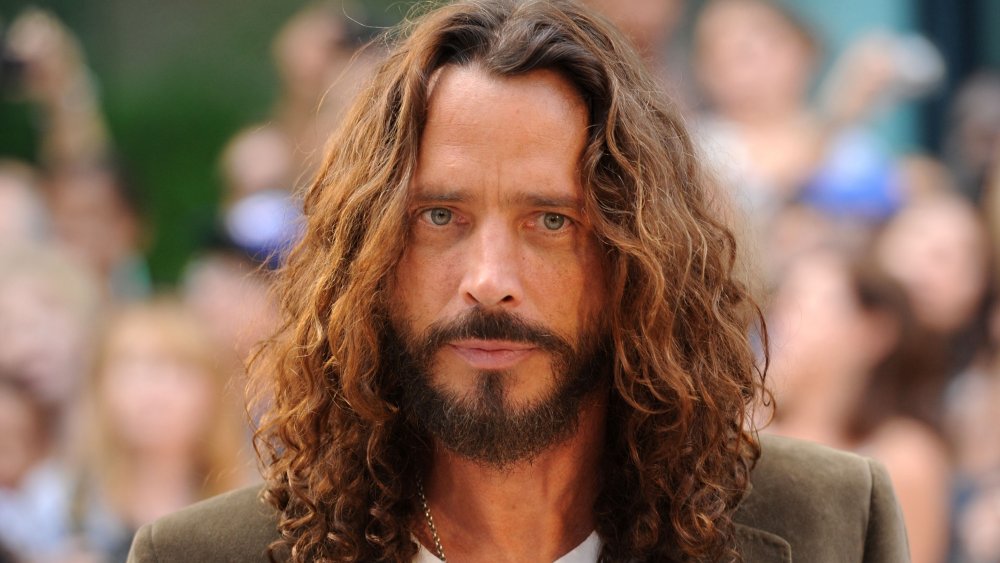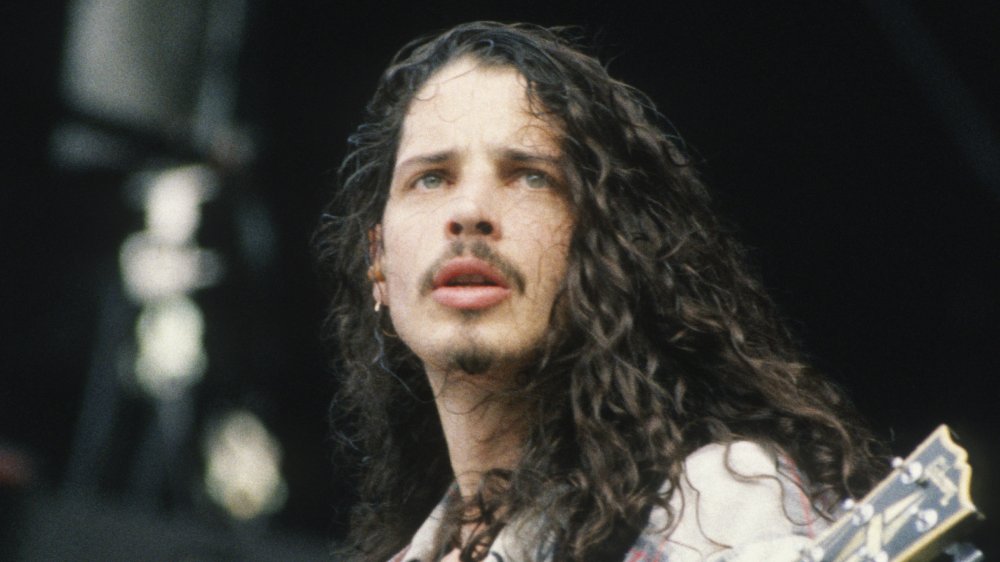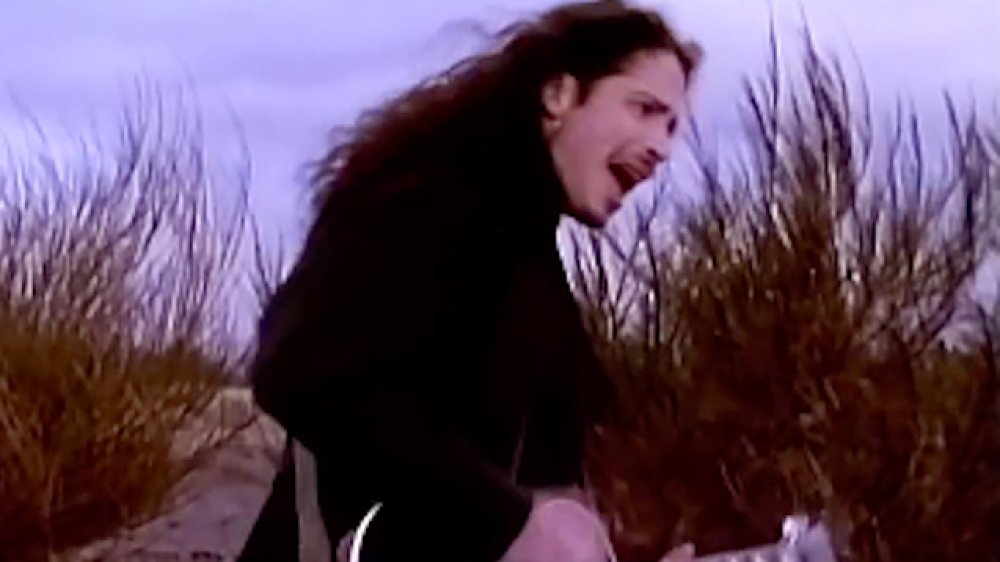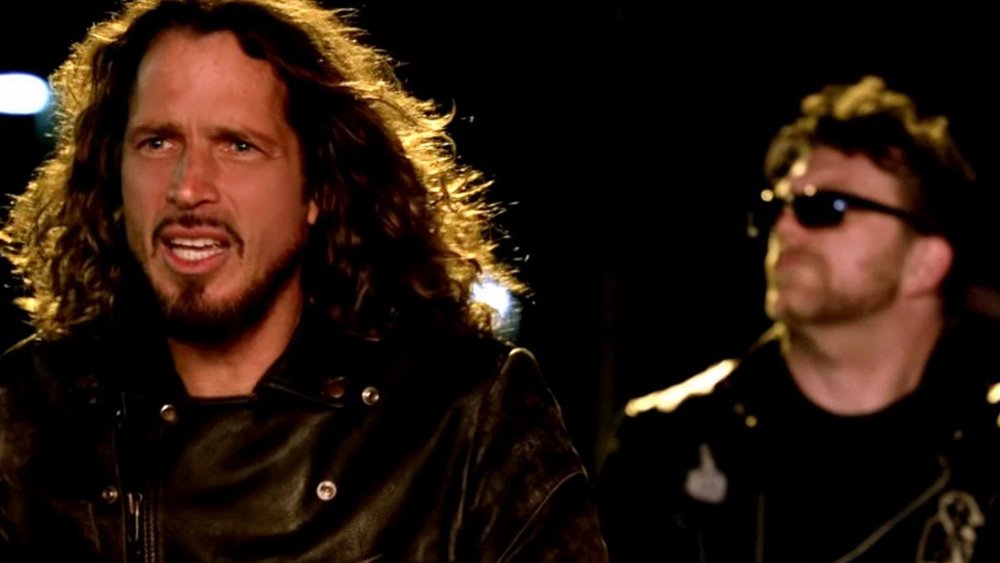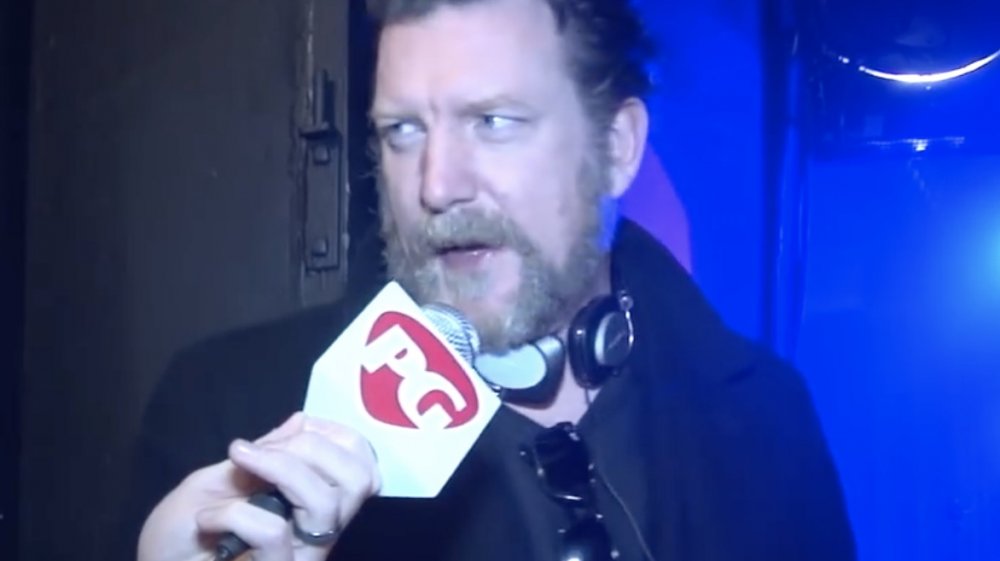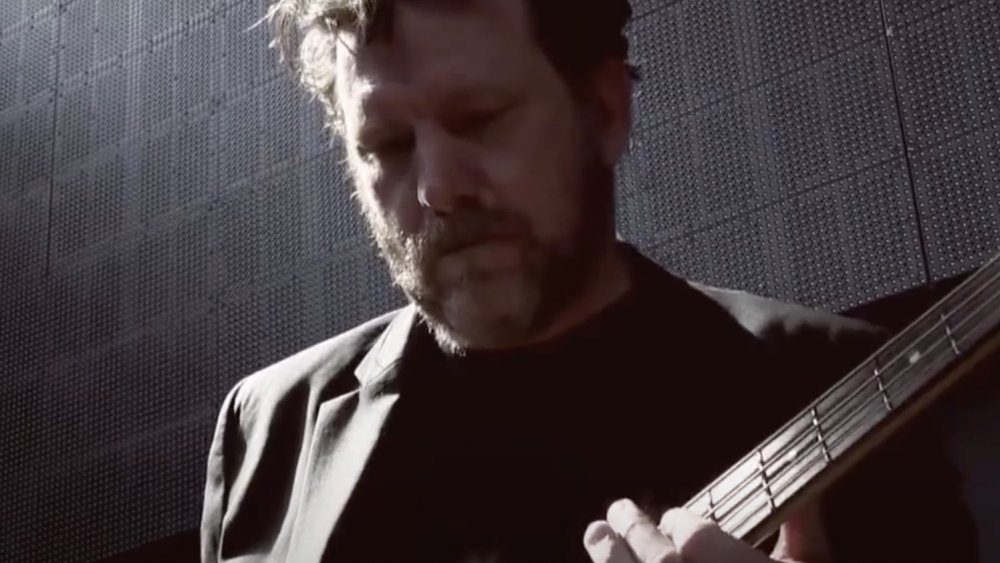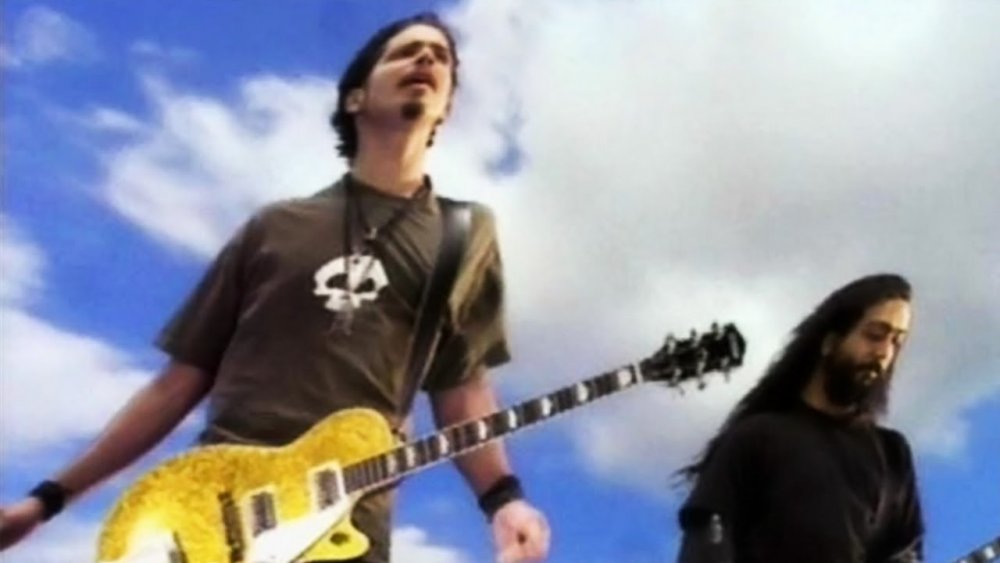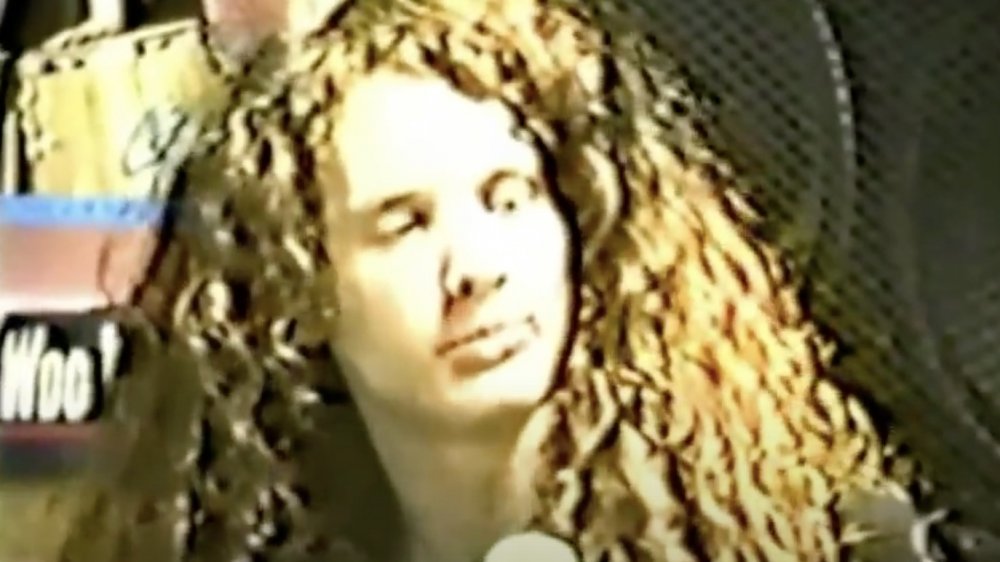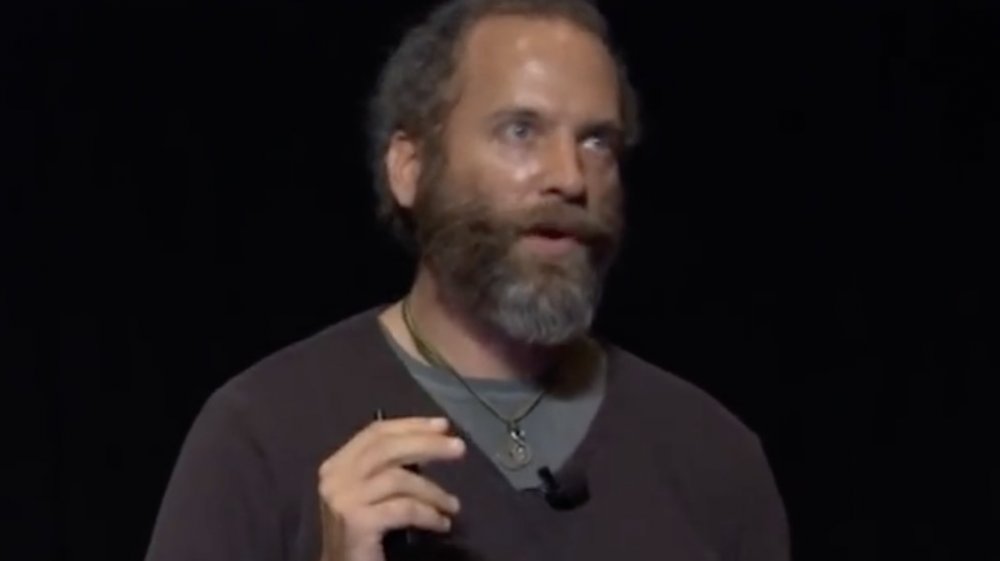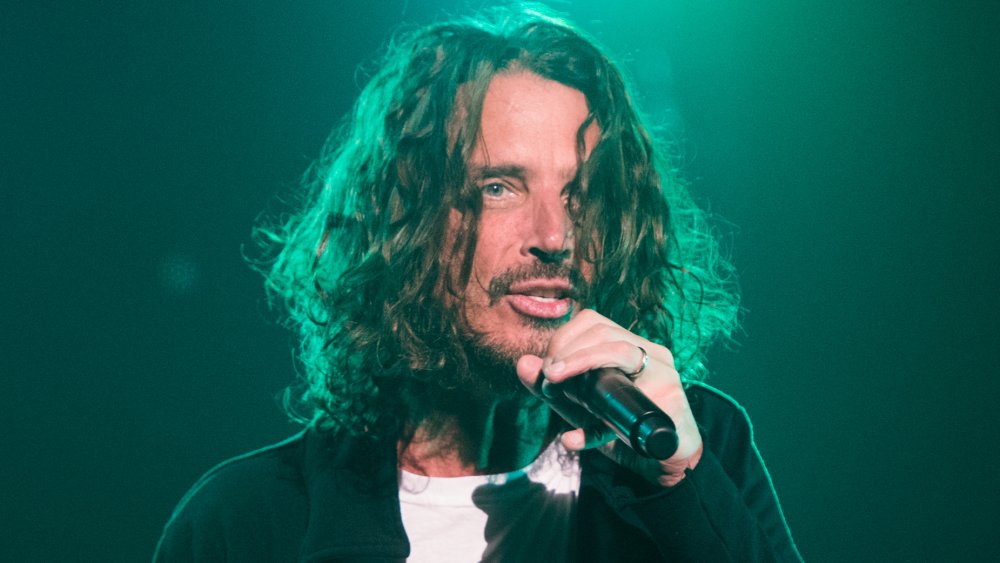The Tragic Real-Life Story Of Soundgarden
Soundgarden was one of the biggest bands in the world in the early 1990s. After earning their keep and building a profile on the burgeoning Seattle scene in the 1980s, the group was in the right place at the right time as the Pacific Northwest's grunge movement became the biggest thing in music and rewrote the history of rock. Alongside Nirvana, Pearl Jam, and Alice in Chains, Soundgarden ruled MTV and the alternative rock airwaves, although it was a bit more of a traditional metal band than their arena rock and punk-leaning peers. Soundgarden also had what nobody else had: the shredding and relentlessly thundering guitar work of Kim Thayil and the soaring, upper-register vocals of lead singer Chris Cornell.
The band often sang of sadness, misery, and despondence, topics the group's members knew all too well from their tumultuous personal lives. Here's a look into the harrowing backstory of Soundgarden.
Chris Cornell struggled with addiction
Soundgarden singer Chris Cornell fought a lifelong battle with drugs and alcohol. He started young, too, growing up in a tough Seattle neighborhood. "We were all selling drugs by the time we were 12, or doing them," Cornell told Rolling Stone in 1994. "I went from being a daily drug user at 13 to having bad drug experiences and quitting drugs by the time I was 14." The reason he quit: He took PCP (otherwise known as angel dust), and it was exceedingly awful.
"I never did any drugs until my late 20s," Cornell told Spin in 2006 of the impact of that event. "Unfortunately, being a child of two alcoholics, I started drinking a lot." Considering himself a functional alcoholic at first, Cornell fell into drugs when he had trouble in his personal relationships, particularly prescription medications. "I didn't eat, I drank a lot, I started taking pills, and some point you just get sick of it." In 2002, at the urging of his bandmates in the newly formed group Audioslave, Cornell entered a rehab facility.
Cornell maintained his sobriety up until 2016. After he tore his shoulder, however, the pain prevented sleep, and a doctor prescribed a benzodiazepine, a class of powerful tranquilizer. "He relapsed," his wife, Vicki Cornell, told Good Morning America. During a single week, the singer "took 20-something pills. And in a nine-day period, 33."
Chris Cornell battled mental health issues
Cornell faced one of his first bouts with mental illness at the age of 14, which he believed was triggered by drugs. "I had a bad PCP experience when I was 14 and I got a panic disorder," Cornell told Spin. Unwilling to come clean to his parents or doctor about his illegal behavior, Cornell turned troublingly inward. "So I became more or less agoraphobic because I'd have flashbacks. From 14 to 16, I didn't have any friends. I stayed home most of the time."
After settling into a prodigious drinking habit, Cornell started self-medicating with prescription meds when he'd suffer a setback. "When my personal life got out of hand, I just got loaded. So I went through a couple of years of depression again. I didn't eat, I drank a lot, I started taking pills," he said.
Eventually, Cornell felt better, but he endured an especially bad bout of depression in his thirties. "For me, I always had one foot in this very dark, lonely, isolated world," he told Men's Health. "I got very dark and there was a ton of isolation. I had to do a lot of things I didn't want to do. Like I had to admit that I made all the mistakes I assumed I would never make. I changed pretty much everything you can change."
The sad reason why Temple of the Dog formed
Mother Love Bone is one of the great "what could have been" stories in rock history. In 1990, while many Seattle and grunge-type bands were on the verge of breaking through to mainstream success, major scenster group Mother Love Bone split up, owing to the death of lead singer Andrew Wood from a heroin overdose just ahead of the release of the band's only album, Apple, according to Rolling Stone. Members Jeff Ament and Stone Gossard started a new band, which would eventually evolve into Pearl Jam. Matt Cameron also played on the demos — he was also drumming for Soundgarden, fronted by Chris Cornell, who was a close friend and roommate of Wood.
Cornell had some unused songs he'd written for Wood, so after the untimely death, the singer got together with Ament, Gossard, and Cameron — along with Pearl Jam recruits Mike McCready and Eddie Vedder — and recorded a one-off album as a would-be supergroup called Temple of the Dog. The LP, Temple of the Dog, arrived in spring 1991 on the strength of the hit "Hunger Strike," in which Cornell and Vedder trade off singing gut-wrenching vocals.
Soundgarden's last show for years was an angry and hostile affair
After touring nearly nonstop for eight months, the stress of the road got to the members of Soundgarden — as did the creative tensions that naturally come to a band that has been together for a decade. The tour's final stop: Honolulu, Hawaii, on February 9, 1997, and boy was it final. The truncated 85-minute show wound up as Soundgarden's last for 13 years.
According to a contemporary account from the Honolulu Advertiser, bassist Ben Shepherd was in a foul mood, seemingly having trouble with his equipment. Around halfway through the set, he repeatedly took out his frustrations on a stage light, which he kept kicking, as well as on the audience, to whom he made profane gestures, and to bandmates Kim Thayil and Matt Cameron, at whom he spit. Singer Chris Cornell took Shepherd aside for a talking-to, but it didn't appear to do much good. After the band finished playing "Blow Up the Outside World," Shepherd threw his bass into the air, flipped the bird to the crowd, and stormed off the stage. Two months later, Soundgarden announced its breakup.
The breakup of the band sent Ben Shepherd on a tragic path
It was the end of an era when Soundgarden split in 1997. Every member of the band was famous and respected at that point, but some had a smoother transition then others. For example, singer Chris Cornell launched a solo career, guitarist Kim Thayil played with the Presidents of the United States of America, and Matt Cameron became Pearl Jam's drummer. Bassist Ben Shepherd, however, experienced a succession of painful and scary events.
After the breakup, "My whole life seemed over," Shepherd told Spin. Not only did Soundgarden dissolve, but so did Shepherd's side band, Hater. As if that weren't bad enough, his fiancée ended their relationship, and then he broke three ribs in an accident. In short order after that, he found himself drinking heavily and addicted to pain pills, and at one point, he overdosed on morphine. "I was laid out in my house for five days, and no one knew it," Shepherd said.
Ben Shepherd was broke and homeless
After more than a decade apart, Soundgarden reunited for a slew of concert dates in 2010 and 2011. For lead singer Chris Cornell, returning to the band that made him an icon was a major milestone after leaving the supergroup Audioslave. For Soundgarden bassist Ben Shepherd, it was a homecoming and a way to end a period of insolvency.
After Soundgarden broke up in the '90s and Shepherd endured a string of personal and health problems, he got back on his feet and contributed to albums by Queens of the Stone Age's Josh Homme and Screaming Trees' Mark Lanegan and joined the band Wellwater Conspiracy. All the while, he resented the Soundgarden split. "We should've just relaxed for a while and lived," Shepherd told Spin upon the band's reunion. "I've just been waiting for these old geezers to snap out of it."
Shepherd's only human, after all — he needed the money. At that point in time, he was recording a solo album but was also technically homeless and in dire financial straits. He'd moved out of his house after breaking up with his partner and spent all his money on his record, and he didn't have much left. "I've been sleeping on studio couches and at friends' houses. I'm totally broke."
Much of Soundgarden's recorded output and equipment is lost
In the early morning hours of June 1, 2008, according to The New York Times, a fire blew through Universal Studios' back lot in Hollywood. It destroyed a warehouse that held the audio library of holdings controlled by Universal Music Group, the world's biggest record company. While black smoke rose up from the Universal lot, the company suppressed and downplayed news about the extent of the fire, and it wasn't until 2019 that the public learned that 100,000 master original recordings had been destroyed and lost forever. Among the artists whose work burned up: Chuck Berry, Peter Frampton, The Who, and Soundgarden, who lost everything. The Seattle grunge band joined up with other acts who lost their work — Hole, Steve Earle, and the estates of Tom Petty and Tupac Shakur – to collectively sue Universal Music Group. That suit was later dismissed.
That isn't the only time Soundgarden experienced warehouse issues. In 2008, the band's storage facility was robbed, and thieves took a recording console, along with a number of guitars and bass guitars belonging to member Ben Shepherd. He was so disheartened and devastated by the theft that he quit playing music for two years.
Jason Everman was fired from Soundgarden (and Nirvana)
There's a very rare club of rock stars who were part of more than one ultra-successful rock band. Take, for example, Paul McCartney of the Beatles and Wings, Dave Grohl of Nirvana and Foo Fighters, or Jason Everman of Soundgarden and Nirvana. According to The New York Times, Nirvana's original drummer, Chad Channing, recommended Everman when the group wanted to hire a second guitarist to supplement Kurt Cobain's playing in 1989. He fit in well enough, but when the band went on tour, Everman entered a period of dark isolation and wouldn't speak with anyone, raising tensions. Instead of just firing Everman, the rest of Nirvana canceled their tour before it was over, drove him back to Seattle, and simply didn't invite him back for any other band activities.
Right as Nirvana passive-aggressively dismissed its guitarist, Hiro Yamamoto suddenly quit Soundgarden, which had just released Louder Than Love, its major-label debut. It was the hottest gig in the Seattle scene, and Everman crushed his audition. He played with the band for more than a year as it toured the US and Europe, but when they got back home, Soundgarden called a band meeting and fired Everman because he wasn't a good fit. Just a few months later, Nirvana (as a trio) and Soundgarden (with new bassist Ben Shepherd) would make their commercial breakthroughs: Nevermind and Badmotorfinger, respectively.
Jason Everman had a rough childhood
Despite an unceremoniously brief time with a pre-fame Soundgarden, music may have saved Jason Everman from taking a more troubled or criminal path. In the first couple years of his life, he grew up more or less in the Alaskan wilderness, before his mother tired of that lifestyle and fled to the Seattle-area town of Poulsbo with Everman in tow. She remarried, and Everman didn't know about his never-seen biological father until he was 13. Everman was very close with his half-sister Mimi MacKay, who did Everman's speaking for him for a long time due to a stuttering issue that their mother reacted to with mockery. "My mother was extremely depressed," MacKay told The New York Times. "A pill-popping alcoholic. Jason and I learned to walk on eggshells and really learned to take care of ourselves.
In junior high, Everman started to act out in the form of vandalism, using an M-80 firecracker to blow up a toilet. He was suspended, but his grandmother found him a therapist to help the boy work out his feelings. The doctor kept a bunch of guitars in his office, which Everman started playing. It helped in his therapy, and more importantly, it calmed him down and gave him a creative outlet for the pressures he faced. By the time he was in high school, he was playing in multiple rock bands.
Chris Cornell died in his hotel room
On May 17, 2017, Soundgarden played a show at Detroit's Fox Theatre, and then-singer Chris Cornell went to his hotel room, according to Billboard. He spoke to his wife, Vicky, and he sounded so off-kilter and was speaking with such slurred words that she asked the band's bodyguard, Martin Kirsten, to see if her husband was okay. When he went, he had to break down a locked room door and then a locked bedroom suite door. That's where Kirsten discovered Cornell on the bathroom floor, not breathing, unresponsive, blood coming out of his mouth, and with an exercise band tied tightly around his neck. After medical personnel attempted several revival techniques, Cornell was pronounced dead. Later that day, authorities ruled the cause of death to be suicide.
An autopsy and toxicology report used by the Wayne County Medical Examiner's office found evidence of several commonly abused substances in Cornell's system, including tranquilizers and allergy medication, but determined that none contributed to his death. Cornell was 51.
If you or anyone you know is having suicidal thoughts, please call the National Suicide Prevention Lifeline at 1-800-273-TALK (8255).
